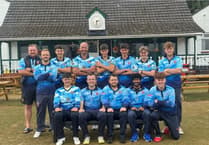A TOP councillor has joked about Welsh rugby’s ongoing woes when agreeing to a new regional sports partnership.
Paul Griffiths, deputy leader of Monmouthshire Council, made the quip in comparison to the latest fall out over Welsh rugby’s professional regions.
He told the council’s cabinet: “I reflect how much we can learn from working successfully from the regionalisation of Welsh rugby.”
Welsh professional rugby has been rocked by the Welsh Rugby Union stating this week it no longer intends funding Wales four professional regions equally.
The Chepstow Labour councillor made the remark after the cabinet agreed for Monmouthshire’s sports development unit to enter the Active Gwent sport partnership hosted by Newport City Council.
It is intended to provide “strategic focus and oversight” to sports development in the region.
Gwent is the last area of Wales to agree to the regional partnership approach which is a national directive from government-funded Sport Wales as part of its national Vision for Sport in Wales.
Regionalisation in Welsh rugby, introduced in 2003, saw the establishment of five professional teams replacing the traditional club structure as the top level of the game in Wales.
The five professional sides reduced to four a year later.
In the latest controversy involving the four regions, Newport-based Dragons has agreed to a new funding agreement with the WRU, which has also taken control of Cardiff after its previous owners were unable to meet financial commitments, while Ospreys and Llanelli Scarlets have refused to sign the new deal with the governing body.
Cllr Griffith, is originally from Swansea, which saw its traditional club replaced at the top table by Ospreys, and was also previously a councillor in Rhondda Cynon Taf where many fans have been bitter over the 2004 closure of the Pontypridd-based Celtic Warriors.
Under the new sport partnership agreement for sports development Newport Council will take a lead role in liaising with Sport Wales, and the new partnerships are required to include representation from a wide array of stakeholders alongside local authority members.
The council’s five sports development officers will still be able to act independently but will also work across Gwent on shared regional objectives and to share resources, best practice and learning.
The annual budget for sport development staffing in Monmouthshire is currently £224,375, with 63 per cent of the funding from the Sport Wales partnership annual agreement.
The projected funding allocation for Gwent is estimated at £2,269,565, while in the 2024/25 financial year Monmouthshire received an annual allocation of £141,894 from Sport Wales and the council has, on average, secured an extra £58,000 a year to deliver specific sport intervention projects.
Funding in future will have to align with the regional partnership’s vision, and when established it will receive the full allocation with funding distributed to the region partnerships across Wales from the third year.
Monmouthshire Labour cabinet member Cllr Sara Burch (Cantref) asked how the council could be assured the “minimum will be spent on administration and the maximum on delivery”, which Cllr Angela Sandles, who is responsible for communities, said would be monitored.
Active Gwent will select a strategic and supervisory board of the five local authority partners, five independent members and an independent chair with Monmouthshire represented by a council officer.





Comments
This article has no comments yet. Be the first to leave a comment.